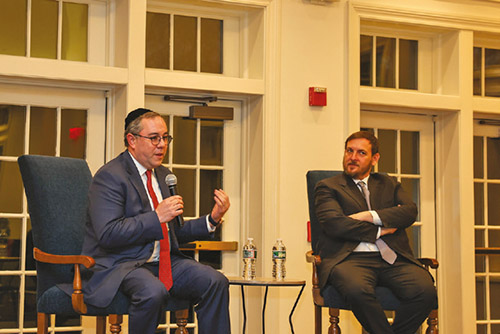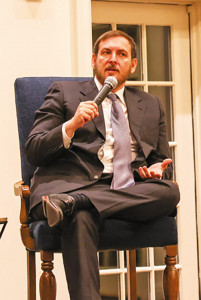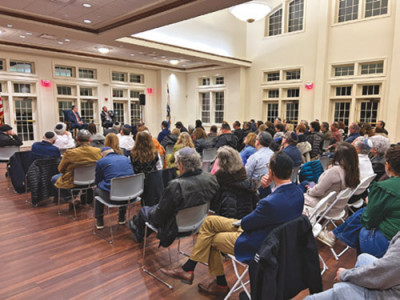
Editors note: Zamir resigned from his post as consul general to New York on March 26, just five days after speaking at this event.
Make no mistake about it, Asaf Zamir is in a tough spot.
He serves as the Israeli Consul General to New York, a high visibility post in a hot spot of political activity and frequent anti-Israel and antisemitic ferment. In that role, he represents Israel in five states—Connecticut, Illinois, New Jersey, New York and Pennsylvania—where, he notes, 45% of all American Jews live. He was appointed to the three-year term in October 2021.
Making things more complicated, he was appointed by the prior Israeli government coalition and is affiliated with the Blue and White party, which is not part of the current government. As has become clear in recent weeks, his views on the proposed Israeli judicial reforms differ markedly from those of Prime Minister Benjamin Netanyahu and his cabinet.

The Times of Israel reported on March 19 that Zamir stated earlier this month at a dinner held by the ANU Museum/Museum of the Jewish People: “I’m deeply concerned [about] the direction the country is going in right now. If you want to have a national home and you want it to be everyone’s home, it must be democratic.” According to the news story, the Foreign Ministry subsequently summoned Zamir to Jerusalem “to clarify” his recent comments.
With those facts in the background, Consul General Zamir came to Congregation Etz Chaim in Livingston to hold a dialogue with the shul’s senior rabbi, Rabbi E. Samuel Klibanoff, on March 21. The program was billed as “Israel at 75: Etz Chaim Celebrates with the Community” and it attracted a capacity crowd in the shul’s social hall.
Asked about the function of the consulate, Zamir stated that in many ways it functions like an embassy and contains units that deal with politics, public relations and other interests. He said that much of its activity relates to programming on college campuses, fighting antisemitism and fostering exchanges in the arts and culture.

Rabbi Klibanoff asked about the ambassador’s background, and Zamir shared that his father is Israeli and he grew up in Florida until he was 9 years old. As he recalled, he and his parents were walking in a mall when his father started talking with him in Hebrew. Zamir said to his dad, “Speak to me in English!” And his father remarked, “That’s it; we’re going back to Israel.” Zamir, who speaks a fluent and unaccented English, said that he is a ninth-generation Israeli and his background enabled him to return to the U.S. in his post and better understand America and American Jews.
Zamir is married to noted Israeli actress Maya Werthheimer, and they have a 3-year-old daughter. He served as deputy mayor of Tel Aviv for two terms and, after joining national politics in 2019, served in the previous government as tourism minister before resigning in October 2020. He joked with the crowd at Etz Ahaim that, as tourism minister during COVID, he managed to change the rate of tourism from 5 million tourists a year to zero.
Rabbi Klibanoff asked the ambassador about his view, as an Israeli, of Jewish life in America. “You have an extremely strong and successful community,” Zamir replied. “I wish we had the pluralism that you have here; it creates a high level of engagement in Jewish life.” Yet he noted that the Jewish community here is very divided, more so than in the past, and is not united in support of Israel. He also pointed out that the younger Jewish generation appears to have a more tenuous connection with their Jewish identity—an observation that appeared, to this writer, to be borne out in the age range of the event’s audience.
Asked by the rabbi to comment on growing security concerns in the American Jewish community, Zamir asserted that it is not a question of enforcement but, rather, a product of the growing prevalence of antisemitism, which has become more acceptable and common in public discourse.
Challenged to offer a unified message from Israel on its 75th anniversary, Zamir demurred, stating: “There is not one message; Israelis are still working out a common understanding of the nature of the state. And the country is becoming more tribal.” He pointed out, as an example, that of the Israeli youth currently in grade school, 52% are members of groups that don’t send their children to the army.
Asked what U.S. Jews can do to foster unity and discourage a sense of civil war in Israel, Zamir said: “I’m a guest here and won’t tell you, ‘Don’t do this or do this.’” He asserted that “your involvement is important and whatever your beliefs are, you should always be able to express them.”
In a short session in which he took questions from the audience, Zamir responded to a suggestion that Israel do a better job promoting its work in the high-tech sector by stating, “Good PR is hard to do, when your opponents don’t care. Cherry tomato promotions are not very effective.” Asked if he has confidence in the prospect for compromise in judicial reform, Zamir said: “I don’t know. It doesn’t feel like we’re close to that. The two sides feel very distinct … I am very concerned.”
Audience members were very pleased with the candid discussion they’d watched. “I thought it was very thoughtful and insightful,” said Jerry Blugrind. “I’m happy to have the ambassador here. They talked about social issues and what needs to be done.”
“He came across to me as very honest,” said Karen A. “He walked the appropriate line and left us thinking very positively about Israel. Nothing is perfect, but Israel is definitely worth fighting for.”
Joel Glazer (full disclosure—that’s my dad) said: “Consul General Zamir was personable, pleasant, and he tried to neatly avoid certain minefields. He said ‘We’re one people,’ but he’s not sure Israelis are convinced of that. And he demonstrated his love of Israel.”
Samantha Migdal, co-president of the shul (with Eli Spigler), stated: “Etz Chaim feels it’s really important to our members and members of the broader community to feel connected to Israel. In light of the ever-changing dynamic there, we thought there was no better time to get an insider’s view on the politics and what we may be able to do to continue to support Israel from the U.S.”
By Harry Glazer










